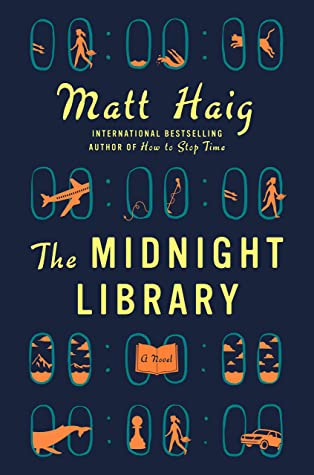
TW: Suicide, Mental Health Issues
The Midnight Library left me in a highly dazed and somewhat philosophical state. This is one of those books that really makes you THINK. Our main character is Nora, a 30-year-oldish woman who feels dissatisfied and unrewarded by life. In the somewhat moderately sized opening section of the book, she describes how she dislikes her entire life and has so many regrets, such as the following: the time she told her father in the car as a kid that she’d quit swimming because she felt her father pushed her too much. The time 2 days ago she walked out on a wedding with her love, Dan. The time she told her brother that she wouldn’t continue with being in his band, his dream, and how it soon fell apart. And throughout the day in her life that’s featured in the opening of the book, Nora increasingly feels like she has less of a reason to live. Her cat dies. Her elderly neighbor tells her that he no longer needs her assistance in getting his medication. She decides to let go and die, yet readers will soon find that she’s transported to a limbo state between life and death known as the Midnight Library, where her old friendly middle school librarian, Mrs. Elm, presents her with various books holding alternative versions and paths of her life. The number of books, her former librarian tells her, are infinite, and initially, Nora tries out lives without the major regrets she had in her “root life,” such as her decision to quit swimming under the pressure of her father. Nora decides to try them because she desires a more fulfilling, successful, and happy life. While she finds success in the literal sense in many of her lives (as a rockstar, an Olympic swimming champion, and a professor of philosophy), readers will soon find she never finds fulfillment. In many of her lives, she finds that she is also taking antidepressants. Unfortunately, because it’s hard to offer my opinion on this book without spoiling it, I’ll go ahead and do so, but this is your warning :). Nora ultimately decides that she wants to be alive and finds that lives that others expected of her, others’ versions of success, such as a life of luxury and wealth, don’t make her happy or feel satisfied. Therefore, the limbo state that Nora entered known as the Midnight Library collapses, and she eventually becomes revived and reenters the living world.
So what is the meaning of all of this? In one of her lives, Nora literally had everything she could possibly want. She had a loving husband, a cute child, a stable livelihood, a stunning house, and a living/loving brother. However, she rejected it because she felt that she didn’t belong because she hadn’t earned it, and she rejected her other lives because they weren’t what Nora herself desired but what others envisioned as the definition of success for her. And perhaps more importantly, most of her lives didn’t make her truly happy. Ultimately, I found that The Midnight Library had a message of to try to live life without regrets and to live a life that you and not someone else envisions as a successful path for you because ultimately, only you know best what you desire in life as well as what will make you happiest. The novel really tries to explore the meaning of life and even has some material related to the butterfly effect –that small changes in the past can have enormous and unpredictable consequences in the future. I also got the message of, kind of related to the book’s message about regrets, to not dwell on the past, especially past mistakes, because they are unchangeable whereas the present is more in one’s control and that if one has a set goal in mind, then there are few limits to what he/she can achieve. So overall, the book really just had great messages about life throughout, although I’m not sure, like some other reviewers of The Midnight Library have suggested, if it does this to the extent of becoming a boring self-help and motivation book. I’d respond to such reviewers by stating that such a book is not necessarily a bad one at all and that Matt Haig writes in engaging enough of a manner to overcome such a negative evaluation of his book.
However, I have to admit that some parts of the book did feel repetitive, especially when Haig inserted a couple of chapters towards the end of the book that pretty much reiterated key messages of his book that had already been mentioned previously. In this sense, I guess the book could’ve been seen as having a boring feel. While it is not bad by any means to reiterate such positive and important messages, I felt that it would’ve been more effective for Haig to deliver his key message in a single section or chapter of the book. Depending on one’s age and background, I feel like Nora’s stories and experiences could be very relatable but also not so much, which could also be a drawback for quite a few readers.
However, I have to admit that something about the book kept it from being life-changing for me. It was good, yes, but something kept it from achieving that next level of being great or exceptional. The book does explore very deep and even philosophical questions about life, so if you find yourself curious or wondering about such topics, this is definitely the book for you. The book is also written in a surprisingly flowy and engaging style that I’m sure any reader can appreciate, not to mention that it’s relatively short in comparison to other accomplished YA books. Lastly, I feel that this book is one of those to which everyone can have a different reaction to and take away something different. Enjoy!

Review by ~ Andrew
Review by ~ Andrew
SHARE THIS: